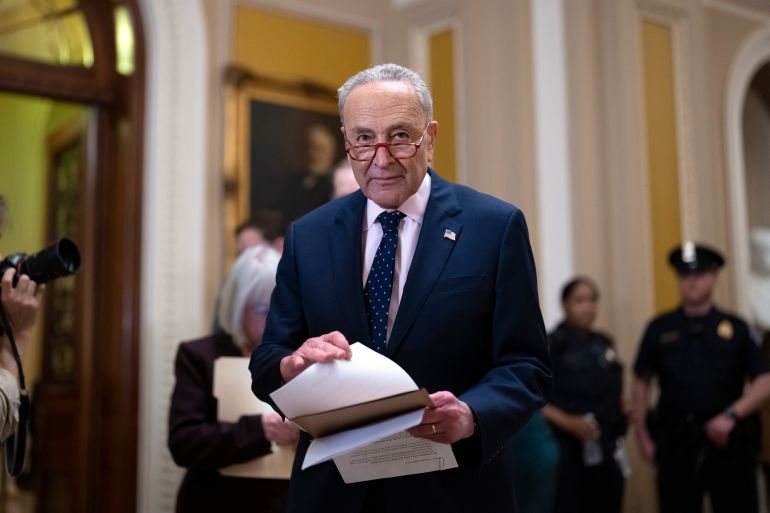US Senate launches latest legislative effort to take on China
Congressional push comes as US secretary of state says he will reschedule China visit cancelled over ‘spy balloon’ row.

Legislators in the United States Senate have launched their latest attempt to counter China, including a bill that top Democrats say aims to limit the flow of technology to Beijing, deter China from initiating a conflict with Taiwan, and tighten rules to block US capital from going to Chinese firms.
Senate Majority Leader Chuck Schumer announced on Wednesday that he will begin crafting the major legislative push, which follows the passage of a bill last year that sought to boost Washington’s competition with Beijing in semiconductors and other technology.
Keep reading
list of 3 itemsBoth sides of Taiwan Strait belong to Beijing: China’s FM
Philippines reports ‘confrontation’ with China in South China Sea
“The Chinese government is not constraining itself in its pursuit to dominate the 21st century,” Schumer, a Democrat, said in a speech opening the Senate.
“And if we in America would rest on our laurels, if we let the CCP [Chinese Communist Party] beat us, it would have serious consequences for the world’s democratic nations.”
Schumer spoke shortly after US Secretary of State Antony Blinken announced plans to reschedule what was meant to be his first official visit to China in February.
That trip was postponed after a Chinese high-altitude balloon was detected – and subsequently shot down – over US territory. American officials have said the balloon was a surveillance device, a claim China denied.
“I think it’s important … that we re-establish regular lines of communication at all levels and across our government,” Blinken said in an interview with the Washington Post on Wednesday, adding he hoped the trip could be rescheduled this year.
“We’re in a competition with China; there’s no secret about that. But we have a strong interest in trying to make sure that that competition doesn’t veer into conflict,” he said.
US climate envoy John Kerry also told the Reuters news agency on Wednesday that China had invited him to visit and meet with Chinese leader Xi Jinping “in the near term” to discuss the global climate crisis.
“This has to be cooperative, notwithstanding other differences that do exist,” said Kerry. “This is not a bilateral issue. This is a universal global threat to everybody in every nation.”
The administration of President Joe Biden has increasingly made countering China’s growing economic and military influence a top priority. Nevertheless, Washington has denied it is seeking a “new Cold War” amid criticism from Beijing and others over its approach.
The US president has also sought to shore up support from allies in the Asia-Pacific region, recently meeting with the leaders of Japan, South Korea, and the Philippines at the White House.
Biden in March also hosted the leaders of Australia and the United Kingdom, with whom the US has formed the so-called AUKUS partnership. The three nations are moving to eventually equip Australia with nuclear-armed submarines.
‘Time is not on our side’
Responding to China’s growing might has been met with relative bipartisan support in both chambers of the US legislature – a rarity amid deep political divisions in the US.
Former Democratic House Speaker Nancy Pelosi and current Republican House Speaker Kevin McCarthy, for example, both recently met with Taiwanese President Tsai Ing-Wen.
Pelosi travelled to Taipei in 2022 and McCarthy met the Taiwanese leader in California earlier this year, drawing rebuke from China, which claims the self-governing island as its own. Increased military exercises and charged rhetoric from Beijing have stoked fears of a potential invasion.
For his part, Biden last year appeared to break from a long-standing policy of strategic ambiguity and said the US would come to the island’s defence in the event of an invasion. The White House later rolled back the statement.
On Wednesday, Schumer said he would be working with leaders of the Senate’s various committees to identify “threats” and draft the new bill, dubbed the China Competition Bill 2.0.
“Time is not on our side. The Xi regime is working every day to catch up and surpass the United States,” Schumer said during a news conference.
“There is no reason our two parties here in the Congress and in the Senate can’t come together and send a strong message to the Chinese government that we’re united in this pressing national security effort, and we are committed to maintaining America’s lead in the future.”
The bill will also seek funding for additional domestic investments in key technology areas and provide a better US alternative to China’s Belt and Road global infrastructure initiative, Schumer said.
Some of the broad policy areas announced as part of the latest effort were included in the bill last year, but were scaled back into the eventual legislation known as the “Chips and Science” Act.
That legislation, signed into law by Biden last year, authorised more than $170bn over five years to boost US scientific research to better compete with China and $52bn in new subsidies for semiconductor manufacturing and research.